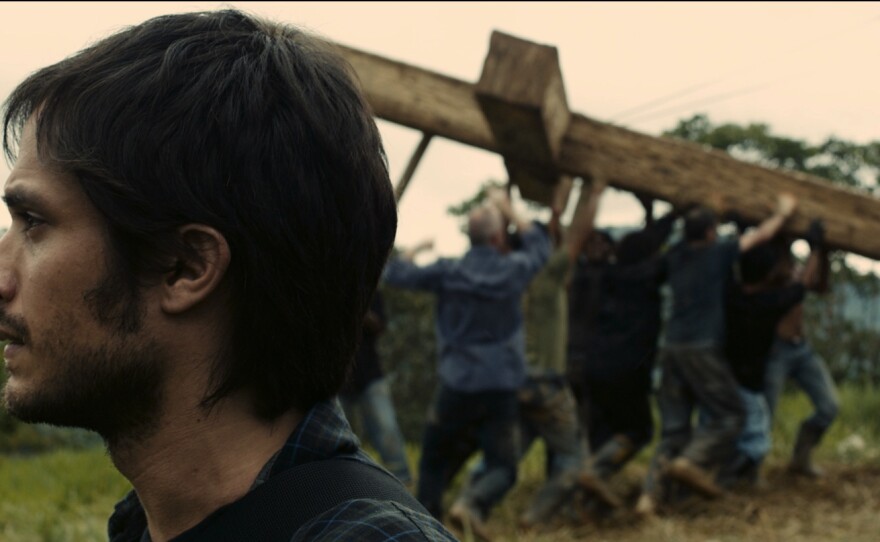Sam Goldwyn once said, "If you want to send a message, use Western Union." The new film "Even the Rain" (opened February 25 at Landmark's Hilcrest Cinemas) begins as a compelling tale and ends up on a soapbox.
"Even the Rain" sets its story against the backdrop of the anti-water-privatization protests that took place in Cochabamba, Bolivia in 2000. A Spanish film crew arrives in Bolivia to make a film about Columbus arriving in the New World. Sebastian (Gael García Bernal) is the director pumped up with passionate ideology. He wants to show how Columbus exploited the indigenous people and then use his film as a means of condemning the injustices of the past and pointing to the continued injustices of the present. Tempering his creative passions is his pragmatic producer Costa (Luis Tosar of "Cell 211"). Costa has to balance Sebastian's grand dreams with a tight budget and the political turmoil in the town where they are shooting. He has chosen Bolivia because he can get extras for a mere $2 a day.

Their casting call for extras attracts hundreds and nearly causes a riot when the producer wants to shutdown before everyone has been seen. Sebastian decides to hire the instigator of the near riot Daniel (Juan Carlos Aduviri) to play the rebel Indian leader in his film. Costa warns that Daniel will be trouble but Sebastian insists. And trouble begins quickly as Daniel stirs the locals to begin demonstrations against a multinational corporation's plans to privatize water or as the protesters say make them pay for "even the rain." Now two passionate, idealistic men clash as each tries to pursue his vision.
Written by Paul Laverty (a frequent Ken Loach collaborator and writer of "The Wind That Shakes the Barley") and Juan Gordon ("Cell 211"), the film begins as a portrait of an artist's obsession to realize his vision and then descends into a message driven story about the continued exploitation of indigenous people. The writers along with director Icíar Bollaín make the parallels between the Spanish conquest of the Americas and the modern spread of capitalism so overt that the film loses its artistic integrity in favor of standing on a soapbox and preaching to us.
It's a shame because it starts so well and has a number of strong elements. While the filmmakers focus on the film within the film and its struggles, it remains intense, compelling, and even slyly humorous. There's a pointed scene in which the filmmakers go to the government officials to arrange for shooting amidst the public unrest. Sebastian, feeling morally superior because of the story he is bringing to light in his film, scolds the government leaders for their abuse of the peasants and workers. But Sebastian is put in his place by the official who points out that the production is only paying the extras $2 a day, so the government is not the only entity exploiting the poor.
The dynamic amongst the three male leads begins well and is riveting in the early stages. The intensity and single-minded determination of Sebastian and Daniel plays well off of Costa's practical nature. And the dynamics seem to be constantly shifting as each man tries to get his own way. Tosar as Costa makes the strongest impression. This isn't surprising to anyone who saw him in "Cell 211." Here he continues to prove that he's a forceful and subtle performer.

I wish the film had focused more on the making of Sebastian's film and let the thematic ideas about the abuse of local people develop more organically and subtly from there rather than letting the message take center stage and disrupt the story. There are some fine scenes of Sebastian trying to get his extras to re-enact horrific scenes from Columbus' conquest. But the film within the film is soon left behind in favor of more direct politics. Laverty dealt with workers and protest in "Bread and Roses," and that film suffered from similar flaws. Laverty and Bollaín have valid points to make but they allow their film to become too sentimental and obvious in the final quarter. The juxtaposition between the production’s ends and its means played out in terms that are too simplistic.
The film needed more of the sensibility of Werner Herzog's "Fitzcarraldo" and the documentary about the making of that film "Burden of Dreams." Both of those films convey how someone can be so consumed by a dream or goal as to lose sight of everything else. "Even the Rain" could have been a fascinating portrait of an artist so consumed by his need to tell a story that he will trample the very ideals he hopes to promote in his art. There is also an intriguing comparison between the passions of Sebastian and Daniel, men who are too similar to notice what they have in common and how that could play out in dangerous ways.
"Even the Rain" (in Spanish with English subtitles) is a flawed but still noteworthy work. It also boasts a trio of strong performances.
Companion viewing: "Fitzcarraldo," "Burden of Dreams," "81/2," "Cell 211"






